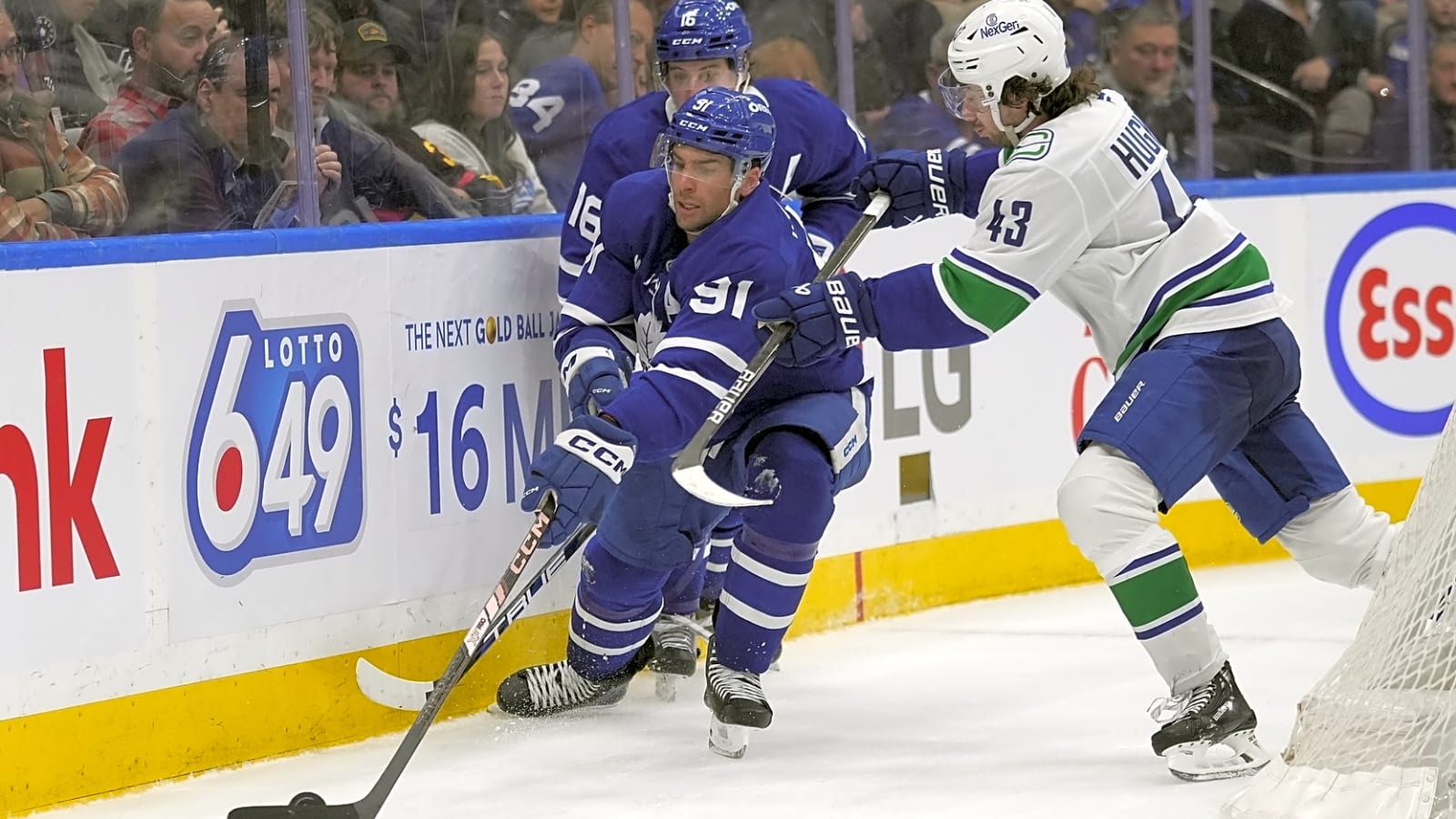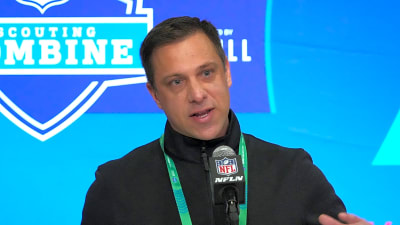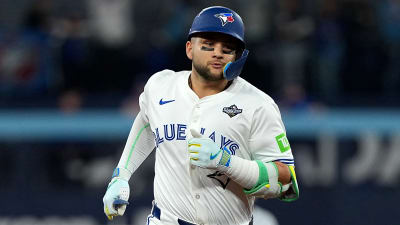
John Tavares always wanted to be a Toronto Maple Leaf. We’ve all seem the pajamas.
And, by all accounts, he still wants to be a Maple Leaf.
The 34-year-old pending UFA told Toronto media recently that when it came to extension negotiations, “You do everything you can to try to find what works on both sides and what is fair for me, my family, the team, and the club. I have expressed my desire to stay and make it work.”
So, if it’s at all possible, Tavares will re-sign with the Leafs.
But let’s imagine, for a moment, that it’s not possible. Change has to be coming to Toronto after yet another devastating playoff collapse. And one of the simplest ways for them to affect that change is to let go some of their most central free agents.
Mitch Marner would seem to already have one foot out the door. But if his departure isn’t enough change, maybe it’s Tavares, too. Perhaps the Leafs go as far as to not offer him a contract. Or perhaps they low-ball him, telling him something along the lines of ‘if you want to stay, you’re going to have to take a significant hometown discount.’
Remember, even in his original homecoming, Tavares still signed for an average of $11 million a season, a record-breaking contract at the time. And even in his statements about staying, he clearly mentions an expectation that a new contract be “fair” to him.
That’s enough to say there’s a real possibility that he and the Leafs don’t come to an agreement. And that raises the question of where Tavares might go instead.
Given his young family, one has to imagine that destinations in the immediate vicinity will be first on his list. We’re talking Ottawa, Montreal, maybe Buffalo and Detroit across the border. But we don’t see any obvious fits there. Montreal needs a centre, but are in the midst of a real youth movement that Tavares doesn’t match. Ottawa, Buffalo, and Detroit, despite their many roster-related needs, are all pretty well-stocked at the centre position.
But there is at least one team out there that can, if not close proximity, at least offer Tavares a quick, direct, border-free flight back to Toronto. A team that needs help at the centre position, and especially help of the high-producing variety.
That team, of course, is the Vancouver Canucks.
The Player
Everyone knows who Tavares is by now. Part of the reason for that is his incredible consistency as a player.
Tavares scored 54 points in 82 games as a 19-year-old rookie back in 2009/10 for a point-per-game average of 0.66. Since his sophomore season onward, however, Tavares’ PPG has stayed between 0.85 and 1.12 for a remarkable 15 straight seasons.
That’s the sort of level production that rarely happens in the best league in the world.
It’s easy to assume that Tavares has slowed down as a result of his age. He played the entire 2024/25 season at age 34, and will hit 35 shortly after camp opens in September of this year. And yet, Tavares just posted 74 points in 75 games, including 38 goals – tied for the second-highest goal total of his career.
The truth of the matter is that Tavares has never had a game built on speed or agility. He’s always succeeded despite his skating, not because of it, and it’s those other components of his game that have helped him produce so consistently – the hands, the vision, the quick release in high traffic. Those are qualities that tend to fade less with age, which makes Tavares less of a liability than the average mid-30s UFA.
There’s an argument to be made that Tavares has aged like a fine wine, especially as it pertains to his all-around abilities. On paper, 2024/25 was one of his worst defensive seasons, marking only the fourth time in his career that his Corsi and Expected Goals have dipped below 50%. And yet, Tavares was still on the ice for 19 more goals for than against at 5-on-5, and did so while playing against a slightly-above-league-average level of competition.
It’s also worth mentioning that Tavares remains one of the best faceoff-takers in the league, rocking a 58.3% rating in 2024/25, fifth-highest amongst regular centres.
Lastly, because we are talking about a Maple Leaf, we’ve got to talk playoff concerns.
Overall, Tavares has 53 points in 75 career postseason games. That’s not a terrific record, and it is a significant stepdown from his regular season production.
Last season’s two points in seven games looked especially bad, though that came at the tail-end of one of Tavares’ worst seasons.
This year, he rebounded to five goals and seven points in 13 games, which is better, but still not up to his usual standard.
The question for any team signing Tavares is this: is his playoff slowdown a result of the general postseason malaise hanging over the entire Maple Leaf franchise, or is it a Tavares thing?
We’d bet on the former.
The Cost
Remember that Tavares wants to be signed for something ‘fair.’ If he were going to take a discount, he’d almost certainly take it from Toronto.
A team getting him to move is going to have to pay him pretty close to his due.
On term, at least, we can narrow it down. Tavares will be 35 before season begins. We imagine he’ll want some sort of commitment on this next contract, but ‘commitment’ to a 35-year-old might be a term of three years, or maybe four at the very most.
For salary, we could certainly suggest a pay decrease for Tavares from the $11 million in compensation he currently collects. But by how much?
Tavares is the 35th-leading scorer over the past four cumulative NHL seasons. He’s easily the second-most-productive UFA this year, after teammate Marner. And the cap ceiling is going up. Way up.
Tavares’ limited list of potential destinations is the only thing that can really step in to limit his salary. If he were shopping himself around to all 32 teams, someone would no doubt pay up big for him. He might even crack double digits again.
The Canucks should not pursue him to that extent. Instead, they should offer him a salary they are comfortable with, hope that it’s the best offer from his choice destinations, and leave it at that. If he signs, great, if not, move on to other targets.
What is that comfortable amount?
For our money, it can’t crack $8 million a season. It should probably, more realistically, start with a ‘7’ instead.
On the whole, that seems cheap for a PPG player. But at the same time, it’s expensive for a 35-year-old. Tavares may come with consistency, but that doesn’t make him absent of risk. If this is a path the Canucks are going to go down, they’ve got to do so carefully.
The Fit
There’s definitely an argument to be made that Tavares is the best UFA centre available.
Sure, if we’re talking all-around impact, the distinction probably goes to Sam Bennett. But Tavares has always handily outproduced Bennett, even at Bennett’s best.
What the Canucks need most is an injection of offence. No UFA, aside from Marner, offers anywhere near as much offensive power as John Tavares.
Tavares might be the only 2C available to the Canucks, outside of the very expensive trade options, that could truly drive his own line, something that could be necessary on a team that is also short on productive wingers.
GM Patrik Allvin has stated a desire to acquire players that fit the age range of his core, which revolves around Quinn Hughes. Tavares is not that. But at the same time, we’ve heard so much about the necessity of making the most of these last years of Hughes current contract – either to convince him to stay, or to take advantage of his presence while he’s still here.
If returning to competitiveness as soon as possible – meaning as of 2025/26 – is the goal, then Tavares could certainly move the Canucks closer to that goal.
He may only have a couple good years left in him, but maybe that’s all the Canucks need from him at this point.
More must-reads:
- Oilers' Tristan Jarry leaves with injury
- 'Heartbroken beyond words': Remembering Greg Biffle, NASCAR's underappreciated star
- The 'NFL's active TD-catch leaders' quiz
Breaking News
Trending News
Customize Your Newsletter
 +
+
Get the latest news and rumors, customized to your favorite sports and teams. Emailed daily. Always free!








